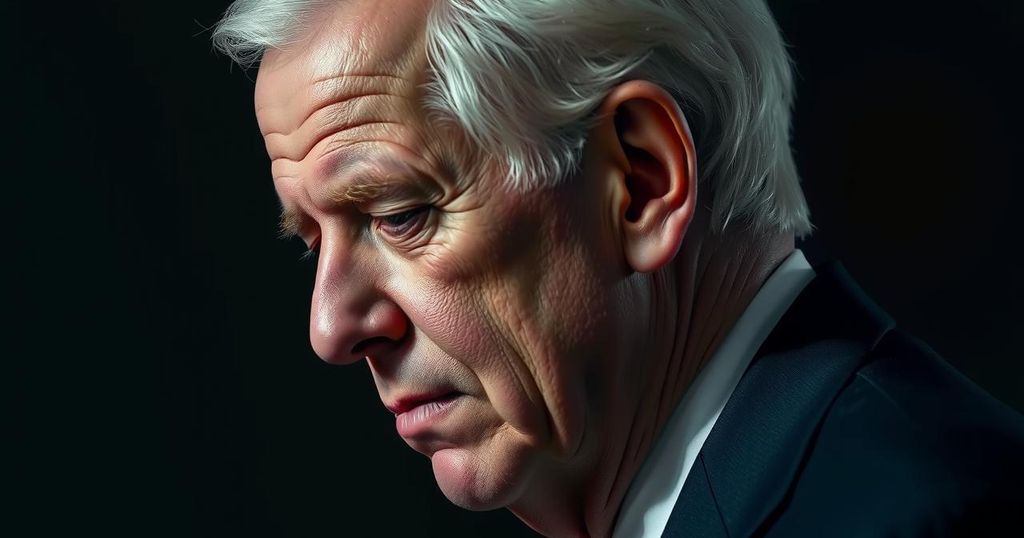President Biden has remained largely silent following the Democratic Party’s recent electoral defeat, despite previously emphasizing the potential dangers of a Trump presidency. His limited public remarks post-election and during an international trip have raised concerns about his leadership amid pressing political and global issues. Biden’s reticence may complicate his legacy as he hands over the mantle to newer leaders.
Following the Democratic Party’s significant defeat in the recent elections, President Joe Biden has noticeably moderated his public presence. Despite prior warnings regarding the consequences of a Donald Trump victory for American democracy, Biden has refrained from articulating his apprehensions or analyzing the factors that contributed to the Democrats losing across various positions. His only substantial acknowledgment of the election results occurred in a brief speech shortly after the votes were counted, wherein he called for unity and understanding among Americans. Since then, Biden has maintained a low profile, even during his recent six-day diplomatic trip to South America, where he made only sparse public remarks and did not hold a press conference—a rarity for an American president during such visits.
Biden’s silence comes at a pivotal point in the United States, as well as globally, leaving a potential leadership gap at a time when the nation’s direction and future are questioned. David Axelrod, a senior advisor during the Obama administration, expressed that it is now time for a new generation of leaders to step forward, noting, “His race is over. His day is done.” Academic Edward Frantz remarked on the necessity for Biden to engage more actively in shaping his narrative, referencing the historical precedent of former President Jimmy Carter, who struggled with relevance during his departure from office. Biden’s supporters assert that he is still processing the implications of the election results, although he has yet to publicly reflect on his role in the party’s performance.
During his address after the election, Biden shared, “Campaigns are contests of competing visions. The country chooses one or the other. We accept the choice the country made.” Biden’s reluctance to engage with the media further underscored his reserved approach, as he sidestepped inquiries regarding both the election outcomes and significant international decisions, such as his policy changes concerning Ukraine’s military aid. American allies abroad, such as France’s Emmanuel Macron and Canada’s Justin Trudeau, have taken the lead in discussing Biden’s policy decisions, indicating a shift in international dialogue relation to the changing political climate in the United States.
While Biden’s presidency has prominently featured the war in Ukraine, his response and engagement in discussions surrounding it have waned following the GOP’s electoral success, reflecting a broader trend of political inertia. His interactions with international leaders have shifted in tone, with counterparts calling for a new beginning in U.S.-China relations while Biden reminisces about past collaborations. As Biden continues to uphold the importance of democratic traditions, he faces mounting pressure to articulate clear and decisive perspectives on domestic and international issues, or risk being overshadowed in a political landscape rapidly evolving beyond his control.
In the context of the recent electoral loss for the Democratic Party, President Joe Biden’s muted response has drawn public and media attention. His previous warnings about the dangers of a Trump presidency starkly contrast with his current reluctance to publicly confront the reality of the Democratic setbacks. Despite being at the helm during a critical juncture in history, Biden’s lack of vocal leadership may reflect a broader struggle to maintain relevance as political tides shift and new leaders emerge. This period has coincided with heightened challenges both domestically and on international fronts, where Biden has traditionally played a pivotal role. Biden’s presidency has frequently focused on issues of democracy and international cooperation, making his silence particularly notable. In the wake of electoral results that some predict may alter the balance of power in the U.S. government, Biden’s public demeanor has raised questions about how effectively he can navigate the remains of his presidency while continuing to champion the causes he deems essential.
President Biden’s notable quietude following the recent elections has left a significant gap in public discourse, especially surrounding pertinent issues of democracy and international relations. As he navigates the aftermath of the electoral defeat, the President’s silence may hinder his ability to shape his legacy and respond effectively to emerging challenges. With calls for a new generation of leadership growing louder, it remains critical for Biden to re-engage with both the American public and global partners, lest he risk being eclipsed on the political stage.
Original Source: www.seattletimes.com






